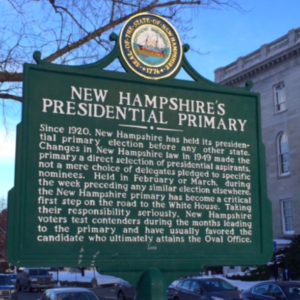When the Democratic National Committee’s Rules and Bylaws Committee met Monday night, they clearly had Iowa’s troubled caucuses as a top target. But under their new criteria, New Hampshire’s First in the Nation primary could become collateral damage.
Granite State Republicans, however, tell NHJournal the GOP has no plans to abandon the Granite State, regardless of the DNC’s eventual decision.
Monday’s meeting was to discuss moving forward with new rules for the early contests in the 2024 nominating process. Under existing rules, four states — Iowa, New Hampshire, Nevada and South Carolina — are exempt from the DNC’s restriction that no state can hold a nominating contest prior to the first Tuesday in March.
However, concerns about the racial make-up of early states like Iowa and New Hampshire have inspired pressure from the party’s progressive wing to change the current system. The new plan would allow up to five states to be part of the early primaries, and there’s no guarantee New Hampshire will remain among that number.
Rules committee member Leah Daughtry, who once ran the DNC’s Convention Committee, said that while the proposal is still in the discussion phase, “we cannot be stuck in a 50-year-old calendar when we’re trying to win 2022 and 2024 elections. It has to be an ever-evolving process.”
“Considering the changing electorate is so important,” Daughtry added.
The new proposal would consider factors like a state’s racial diversity, competitiveness in the general election and its ability to competently execute a primary or caucus. The proposal also calls for moving away from caucuses, which progressive Democrats have denounced as undemocratic.
Given Iowa’s fumbling of the 2020 primary — the Associated Press was unable to declare a winner — and the state’s demographics, the Hawkeye State is clearly in the DNC’s hot seat. However, Iowa has a much better track record of picking the party’s eventual nominee than New Hampshire. Joe Biden was the first Democratic nominee to lose Iowa since 1992 when favorite son U.S. Senator Tom Harkin won the caucus, and Bill Clinton finished in fourth place.
The last Democrat who wasn’t an incumbent president to win New Hampshire and go on to become the party’s nominee was John Kerry in 2004. Joe Biden came in fifth in 2020.
The Granite State has come under fire from Democrats concerned about the state’s demographics for years. When Sen. Kamala Harris dropped out of the 2020 presidential primary, Rolling Stone senior writer Tim Dickinson wrote, “Iowa is 91 percent white. New Hampshire is 94 percent white. These states are off the charts white, and yet the Democratic Party gives the electorates in these states effective veto power over the nomination process.”
Former DNC Chair Tom Perez has said, repeatedly and publicly, he believes having Iowa and New Hampshire go first is a mistake. “A diverse state or states need to be first,” Perez said last year. “The difference between going first and going third is really important. We know the importance of momentum in Democratic primaries.”
The current DNC chair, Jaime Harrison, who previously served as head of South Carolina’s Democratic Party, was on the Zoom meeting Monday night. He appeared to echo concerns about racial diversity. “Our party is best when we reflect the people we serve,” he told the committee.
Joanne Dowdell, who is representing New Hampshire on the committee, was largely silent during Monday night’s meeting. Dowdell, who’s only spent a few years in New Hampshire and currently lives in Washington, D.C., simply urged the committee to pursue openness and transparency in the process. None of the participants spoke up for any individual states during Monday’s meeting.
Republicans like National Committeeman Chris Ager insist the GOP isn’t moving their first primary away from New Hampshire any time soon. At their winter meeting, an RNC committee voted unanimously to keep the current primary schedule for 2024.
According to polling, Granite State Democrats aren’t nearly as adamant. A 2021 Granite State Poll from the UNH Survey Center found just 29 percent of state Democrats support the New Hampshire law enshrining the First in the Nation primary. A solid 43 percent of Democrats are neutral and 17 percent oppose the #FITN law.
That’s compared to 61 percent of registered Republicans and 48 percent of undeclared voters who support the law.
And all four Democratic members of the state’s federal delegation supported a law to federalize elections which, according to former Secretary of State Bill Garder (also a Democrat), would put the state’s primary in danger.
“If Congress can tell us how to vote, and that we have to let people vote early and vote late, why can’t they tell us when we can have our primary?” Gardner said last year. “If they can go against our constitution, they can override our First In The Nation law.”
New Hampshire Democratic Party Chair Ray Buckley says he’s not worried about the state’s #FITN status. “The conversation about the early states happens every four years, and this year is no different,” Buckley said in a statement to the Concord Monitor.
The process has a way to go before a final decision about the DNC’s primary calendar is made. Harrison announced “three national virtual listening sessions this year, to make sure we’re hearing the voices of Democrats across the country.”
If the party listens to progressives advocating identity politics and a state’s track record for picking presidential nominees, Iowa may not be the only state in trouble.





